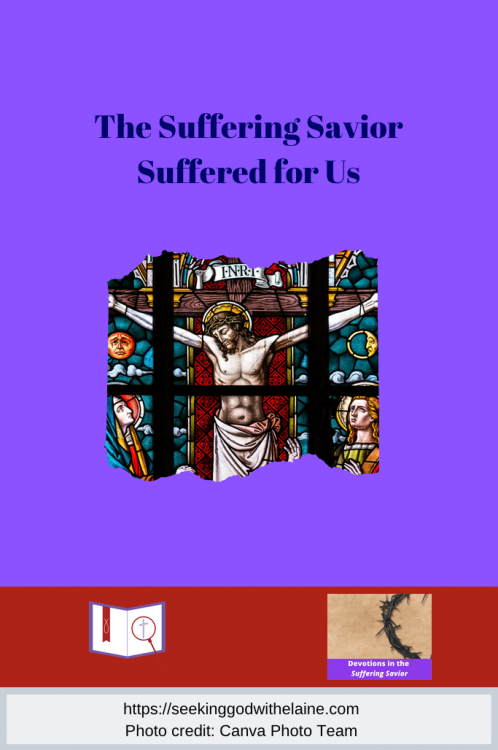Even though we despised and rejected Him, the Suffering Savior bore our sorrows and grief. This daily devotional looks at exactly what that means and why He did that.
Nuggets
- Jesus loved us so much that He bore our griefs and sorrows.
- Even though Jesus was sinless, He became the Suffering Savior to bring us salvation.
- Disciples are told we should be sheep who follow, not sheep who go astray.
Devotions in the Suffering Savior series

Isaiah started Chapter 53 off by telling how we would despise and reject the Suffering Savior. He goes on to say how He suffered for us.
The suffering came because He loved us. It makes us question why we despise and reject Him. But we do. Let’s take a look.
Let's Put It into Context
- We know how much trouble the Israelites had in believing that Jesus was the Suffering Savior — and we have trouble, too.
- It looked like God’s promise that a descendant of David’s would reign forever had withered and died, but the stump got an offshoot.
- Jesus didn’t just know grief’s face so He could wave as He passed by; He was on a first-name basis.
Did Jesus Carry Our Sins?
“Surely He has borne our griefs And carried our sorrows; Yet we esteemed Him stricken, Smitten by God, and afflicted” (Isa. 53: 4 ESV)
Jesus loved us so much that He bore our griefs and sorrows. But since we have this delusion that evidence of God being with us is when things are going right, the Jews didn’t think God was with Jesus.
Part of the problem is we use wrong definitions of grief and sorrow. We look at the worldview definitions. We equate grief and sorrow with all the trials we go through down here.
Jesus bore our sins. As disciples, we are to mourn that we disobey God’s laws and commandments. It is to make us distressed that our relationships with God are broken.
One thing we can take to the bank is that Jesus loves us. Has to. Who would die for someone they didn’t love?
Look at the verbs used — borne and carried. These are action verbs.
I know sins aren’t tangible to us, but they were to Jesus when He went to the cross. “He personally carried our sins in his body on the cross so that we can be dead to sin and live for what is right. By his wounds you are healed” (I Pet. 2: 24 NLT).
No, we aren’t going to understand how Jesus did that. We have to take that on faith. Faith is the conviction that the doctrines revealed in God’s Word are true, even if we do not understand all aspects of them, a belief which impacts our lives.
Think of it this way. God made us to be perfect. The perfected state indicates the combination of the graces which, when all are present, form spiritual wholeness or completeness.
Glossary
We willfully chose to disobey God when Adam and Eve committed the original sin. That broke everything.
Glossary
Jesus had to fix it. He willingly came to give us the opportunity to restore things to the way they were. He had to willingly take on sins that He would never have borne otherwise.
But we have this delusion that evidence of God being with us is when things are going right. If we have smooth sailing, God must be with us.
Things were not going smooth sailing with Jesus. He ended up dead on the cross. That made the Jews think that God wasn’t with Jesus.
Ooo, baby. They were wrong there.
God was very much with Jesus — and very pleased. “When all the people were baptized, Jesus also was baptized. As he was praying, heaven opened, 22 and the Holy Spirit descended on him in a physical appearance like a dove. And a voice came from heaven: “You are my beloved Son; with you I am well-pleased’” (Lk. 3: 21-22 ESV).
Look at the verbs again — borne and carried. Those are past tense. The Suffering Savior’s suffering has ended.
Let’s roost on stricken, smitten, and afflicted for a minute. We weren’t going to be saved unless Jesus suffered. Come to think of it, we weren’t going to be saved unless Isaiah, Jeremiah, Ezekiel and all the others suffered.
Stricken was when someone got a sudden, severe illness. In many cases, the illness was leprosy.
Resource
Okay. Go back to the last devotion. Remember, I had such trouble with Spurgeon thinking that verse 3 could mean that Jesus was comparable to a leper because of His humbling Himself.
Resource
Here we are again. Was I wrong?
Skinner felt this picture was suggested by several descriptions:
- “His marred and disfigured form”
- “His isolation from human society”
- “The universal conviction of His contemporaries that He was a special object of the Divine wrath”
Resource
Okay, since Jesus experienced what we experience, He could have had a major illness. That illness could have been leprosy. I think we would have been told if that were the case.
But we have to remember, as Skinner pointed out, Isaiah wasn’t face to face with Jesus. God — Himself or through the Holy Spirit — was feeding this to him. Isaiah may have been like John in Revelation — giving as close a picture as he could to get his point across.
So, what do we make of all of this? Jesus didn’t have smooth sailing here on earth. He experienced trials just as we do.
Add on top of that, Jesus knew what His mission was. He was to bear our sins. That is a lot of sins.
Jesus willingly completed His mission.

The Suffering Savior Was a Substitute
“But he was pierced for our transgressions; he was crushed for our iniquities; upon him was the chastisement that brought us peace, and with his wounds we are healed” (Isa. 53: 5 ESV)
Even though Jesus was sinless, He became the Suffering Savior to bring us salvation.
Jesus became our substitute — the propitiation. Lewis wrote, “Instead of dying for His own sins, He was wounded for our transgressions.”
Resource
Glossary
We should be happy that the Suffering Savior was willing to pay the penalty for our sins. We should mourn that He had to — and that we keep on sinning.
To read a related devotion, click the button below.
Oh, yeah. That creates a conflict within us. It puts a weight on us.
Transgressions and iniquities are old-time churchy words. Transgressions, according to the Holman Bible Dictionary, means “image of sin as overstepping the limits of God’s law.” Iniquities, in the Holman Bible Dictionary, rerouted us to sin. Sins are actions by humans that disobey God and break one of His reasonable, holy, and righteous laws and commandments, goes against a purpose He has for us, or follows Satan’s promptings.
Resource
I don’t know if that helps me distinguish between the two or not. So, let’s see how Gibbon differentiated them. He wrote, “It is transgression — the crossing of a boundary and trespassing upon forbidden land. It is iniquity — the want of equity: the absence of just dealing.”
Resource
Hmmm. In Elaine-speak, transgressions are sins of envy and covetousness. Iniquities are sins of wanting to be like everyone else instead of God.
I think it is easy, in this verse, to keep the focus on the suffering. What we sometimes gloss over is the victory. Our iniquities were crushed. They are gone. Instead, we have peace and restoration. We are healed.
Bevan brought up a good point. He wrote, “The death of Jesus is the apparent defeat and destruction of one who possessed extraordinary and supernatural powers.”
Resource
Dickson reminded us that this section is prophecy. Jesus’ wounds point to when He would be pierced with a spear on the cross.
Resource
The bottom line is, because the Suffering Savior hurt, we are healed. Our sins are forgiven. Only He could pay the price to earn our forgiveness.
Are We Really Like Sheep?
“All we like sheep have gone astray; we have turned — every one — to his own way; and the Lord has laid on him the iniquity of us all” (Isa. 53: 6 ESV)
Disciples are told we should be sheep who follow, not sheep who go astray.
I live in a family where the ladies are directionally challenged. My mother lived in a town for 12 years where the sun rose in the west and set in the east. My cousin said she could turn around three times and be lost in her back yard. Her daughter said she can get lost heading towards the bathroom. I can get lost even with the GPS.
So, I had to laugh when Talmage said sheep get lost trying to find other pasture. Been there, done that, bought the t-shirt.
Resource
But how many of us don’t want to be labeled as sheep? We don’t want to be lost. We don’t want to be dependent.
Brown brought up a good implication. If we as sheep are now astray, that meant that previously, we were in the fold.
Resource
That implies that the sheep are backsliders. Backsliding is when those who have made a profession of faith return to their sinful lives.
We can get some good advice from Manton’s sermon.
- If we don’t have a Shepherd, we are not going to make it to the next pasture.
- If we get lost, we aren’t going to find our way back ourselves.
- If we play follow the leader, we need to follow the right Leader.
- If we leave the fold, we are setting ourselves up for some dangerous trails.
Resource
The sad part of this is each and everyone one of us have slipped out of the fold. “All of us, like sheep, have strayed away. We have left God’s paths to follow our own. Yet the LORD laid on him the sins of us all” (Isa. 53: 6 NLT).
Let’s look at it this way. Each of us have our own way. We can easily head down the wrong way.
God only has one way. “Jesus answered, ‘I am the way and the truth and the life. No one comes to the Father except through me’” (Jn. 14: 6 NIV).
That Way takes us a very specific way. “Enter by the narrow gate. For the gate is wide and the way is easy that leads to destruction, and those who enter by it are many. For the gate is narrow and the way is hard that leads to life, and those who find it are few” (Mt. 7: 13-14 ESV).
Glossary
In order to be a sheep, we have to stay in the fold and follow the Shepherd. We don’t want to be a goat on judgment day.
Glossary
Even though we are sheep, traipsing down the paths in the wrong direction, the Suffering Savior took our sins upon Himself.
Spurgeon asked an interesting question: “… Was it just that sin should thus be laid upon Christ?” He thought the answer was yes.
Resource
What I get from Spurgeon’s explanation is that the intent of the Plan of Salvation was only to address the consequences of the original sin — our separation from God and spiritual death. That was what the Suffering Savior signed up for.
Jesus did this because He was the Shepherd and we are the sheep. He knows us. “I am the good shepherd; I know my sheep and my sheep know me” (Jn. 10: 14 NIV). The Shepherd takes care of the sheep.

Making the Connections
Brown said something really beautiful. He wrote, “The Lord — electing to perpetuate the sinful race, to endure all the sorrow which Heaven would look upon, and the question which would fall upon His government through the existence of a world so full of wrong and wretchedness, in a universe whose order was his charge — stooped at once, in infinite, tender pity, to lift the burden, and to become a fellow-wayfarer in the sorrowful pilgrimage to which man had doomed himself by his sin.” God chose to fix what we broke.
Resource
Jesus also elected to be our Suffering Savior. He was God. There was no need — on His part — to become man. He is the One Who became one of us. He became our substitute.
Clemance made an excellent observation. He wrote, “… Transgressions; iniquities; wanderings, are ours. Wounds; bruises; chastisements; stripes, are His.”
Resource
It is all about choice. God and Jesus made it for us.
Non-believers have difficulty seeing the need for the choice. They don’t see their actions as sins, or they don’t see Jesus as the Suffering Savior.
We have to make the choice — do we believe in the Plan of Salvation or not?

How Do We Apply This?
We have to make a choice. Not choosing is a choice of no.
Are we going to admit we have been separated from God? Are we going to believe that the Suffering Savior is the only savior we are going to get? Are we going to confess that God, as Sovereign God, made us and wants us to live our lives for Him?
We need to make a choice of yes.
To do that, think about what Spurgeon directed us to ponder.
- “The astounding mass of sin that must have been laid on Christ.
- “The amazing love of Jesus which brought Him to do all this.
- “The matchless security which this plan of salvation offers.
- “What, then, are [the] claims of Jesus Christ upon you and me?”
Resource
When we think of what Jesus did and why, it shows us the importance of believing in Him. Think about it.
Gracious Heavenly Father. Jesus was Your Suffering Servant. He is our Suffering Savior. Lord, we choose Him. We choose You. Amen.
What do you think?
Leave me a comment below (about this or anything else) or head over to my Facebook group for some interactive discussion.
If you don’t understand something and would like further clarification, please contact me.
If you have not signed up for the email daily or weekly providing the link to the devotions and the newsletter, do so below.
If God has used this devotion to speak with you, consider sharing it on social media.
Pingback: The Suffering Savior Suffered Willingly – Seeking God with Elaine